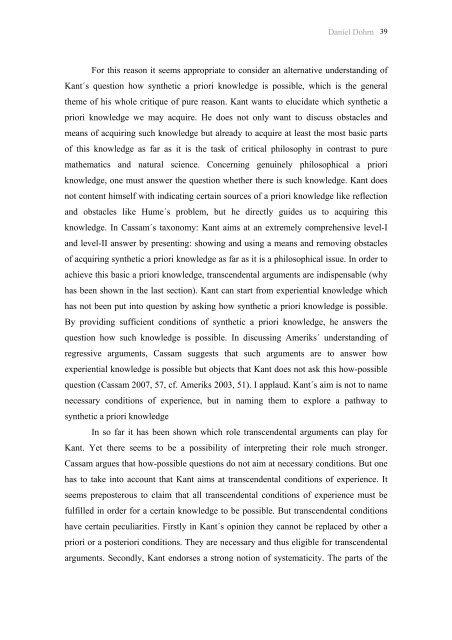Complete Issue in PDF - Abstracta
Complete Issue in PDF - Abstracta
Complete Issue in PDF - Abstracta
You also want an ePaper? Increase the reach of your titles
YUMPU automatically turns print PDFs into web optimized ePapers that Google loves.
Daniel Dohrn 39<br />
For this reason it seems appropriate to consider an alternative understand<strong>in</strong>g of<br />
Kant´s question how synthetic a priori knowledge is possible, which is the general<br />
theme of his whole critique of pure reason. Kant wants to elucidate which synthetic a<br />
priori knowledge we may acquire. He does not only want to discuss obstacles and<br />
means of acquir<strong>in</strong>g such knowledge but already to acquire at least the most basic parts<br />
of this knowledge as far as it is the task of critical philosophy <strong>in</strong> contrast to pure<br />
mathematics and natural science. Concern<strong>in</strong>g genu<strong>in</strong>ely philosophical a priori<br />
knowledge, one must answer the question whether there is such knowledge. Kant does<br />
not content himself with <strong>in</strong>dicat<strong>in</strong>g certa<strong>in</strong> sources of a priori knowledge like reflection<br />
and obstacles like Hume´s problem, but he directly guides us to acquir<strong>in</strong>g this<br />
knowledge. In Cassam´s taxonomy: Kant aims at an extremely comprehensive level-I<br />
and level-II answer by present<strong>in</strong>g: show<strong>in</strong>g and us<strong>in</strong>g a means and remov<strong>in</strong>g obstacles<br />
of acquir<strong>in</strong>g synthetic a priori knowledge as far as it is a philosophical issue. In order to<br />
achieve this basic a priori knowledge, transcendental arguments are <strong>in</strong>dispensable (why<br />
has been shown <strong>in</strong> the last section). Kant can start from experiential knowledge which<br />
has not been put <strong>in</strong>to question by ask<strong>in</strong>g how synthetic a priori knowledge is possible.<br />
By provid<strong>in</strong>g sufficient conditions of synthetic a priori knowledge, he answers the<br />
question how such knowledge is possible. In discuss<strong>in</strong>g Ameriks´ understand<strong>in</strong>g of<br />
regressive arguments, Cassam suggests that such arguments are to answer how<br />
experiential knowledge is possible but objects that Kant does not ask this how-possible<br />
question (Cassam 2007, 57, cf. Ameriks 2003, 51). I applaud. Kant´s aim is not to name<br />
necessary conditions of experience, but <strong>in</strong> nam<strong>in</strong>g them to explore a pathway to<br />
synthetic a priori knowledge<br />
In so far it has been shown which role transcendental arguments can play for<br />
Kant. Yet there seems to be a possibility of <strong>in</strong>terpret<strong>in</strong>g their role much stronger.<br />
Cassam argues that how-possible questions do not aim at necessary conditions. But one<br />
has to take <strong>in</strong>to account that Kant aims at transcendental conditions of experience. It<br />
seems preposterous to claim that all transcendental conditions of experience must be<br />
fulfilled <strong>in</strong> order for a certa<strong>in</strong> knowledge to be possible. But transcendental conditions<br />
have certa<strong>in</strong> peculiarities. Firstly <strong>in</strong> Kant´s op<strong>in</strong>ion they cannot be replaced by other a<br />
priori or a posteriori conditions. They are necessary and thus eligible for transcendental<br />
arguments. Secondly, Kant endorses a strong notion of systematicity. The parts of the




